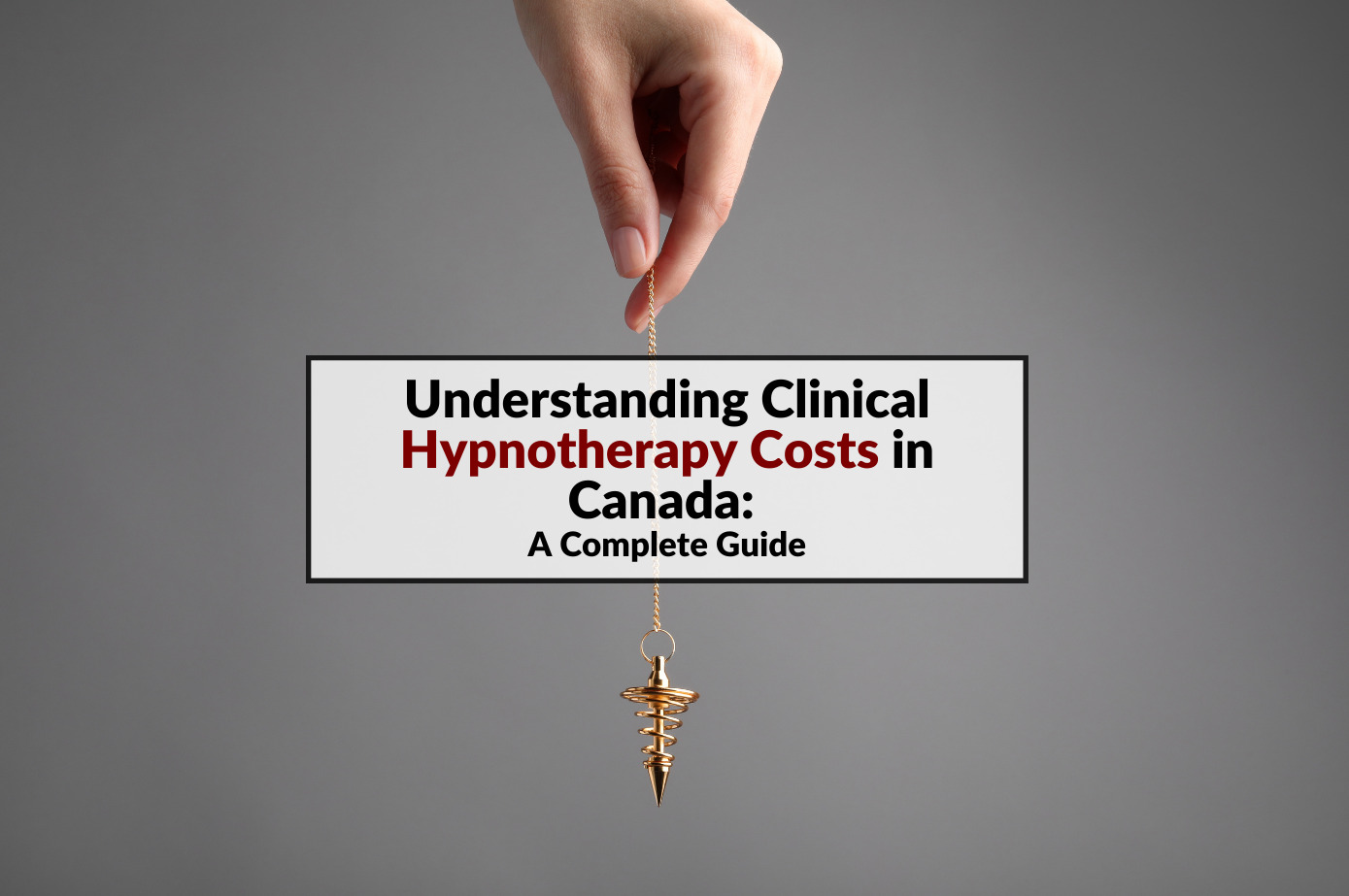Clinical Hypnotherapy Edmonton

We offer professional and transformative clinical hypnotherapy services to support you in achieving your personal goals and enhancing your overall well-being. Our team of skilled registered clinical hypnotherapists are dedicated to helping you harness the power of your subconscious mind for positive change and for personal growth.
What is Clinical Hypnotherapy?
Clinical hypnotherapy is a therapeutic approach that combines hypnosis techniques (guided relaxation, focused attention, and suggestive imagery) with psychological principles to address a wide range of issues and challenges. Clinical hypnotherapy utilizes the altered state of consciousness to provide therapeutic interventions. It aims to tap into the subconscious mind to facilitate positive changes, enhance relaxation, manage stress, overcome limiting beliefs, and address various emotional and behavioural issues. This deeply relaxed state of trance allows for the exploration and resolution of challenging thoughts, feelings, and memories in a safe environment.
Specific techniques which your practitioner may rely include Body Relaxation, Directed Meditation, Age Regression, and Guided Imagery.
How Can Clinical Hypnotherapy Help You?
Clinical hypnotherapy has proven effective in assisting individuals with various concerns, including:
- Smoking Cessation: Break free from the grip of smoking and develop healthier habits and behaviors.
- Weight Management: Discover a positive relationship with food, overcome emotional eating, and achieve your desired weight and body image.
- Stress and Anxiety: Learn relaxation techniques, reframe negative thought patterns, and build resilience to manage stress and anxiety more effectively.
- Phobias and Fears: Overcome phobias and fears that limit your everyday life and experience newfound freedom and confidence.
- Fertility: Address underlying psychological factors that may impact fertility and increase the chances of conception.
- Performance Enhancement: Enhance your focus, concentration, and self-confidence to excel in sports, academics, public speaking, or any other area of performance.
- Pain Management: Utilize the power of your mind to reduce and manage chronic pain, promoting physical and emotional well-being.
- Self-Improvement: Boost self-esteem, improve motivation, develop empowering habits, and unlock your full potential for personal growth.
Is Clinical Hypnotherapy Safe?
While clinical hypnotherapy is generally considered safe, there are some potential risks to be aware of. These include:
- Emotional discomfort: Exploring deep-seated thoughts, feelings, or memories during hypnosis can sometimes evoke emotional responses that may cause temporary discomfort.
- False memories: In rare cases, there is a possibility of false memories being created or the distortion of actual memories while under hypnosis. This highlights the importance of working with a qualified and ethical hypnotherapist.
- Vulnerability to suggestion: While in a hypnotic state, individuals may become more open to suggestion. This can be advantageous for positive change but also means it is crucial to ensure the hypnotherapist’s suggestions align with your goals and values.
- Unresolved underlying issues: Hypnotherapy may bring forth unconscious issues or emotions that require further exploration and support. It is essential to have a supportive therapeutic environment to address these underlying concerns.
It’s important to consult with a qualified and experienced clinical hypnotherapist who adheres to ethical practices. They can discuss any potential risks, answer your questions, and ensure that hypnotherapy is a suitable option for your specific circumstances.
Our Approach and Commitment to You
We believe in a client-centered approach, tailoring each hypnotherapy session to your specific needs, goals, and preferences. Our clinical hypnotherapists will take the time to understand your unique circumstances and guide you through a personalized therapeutic journey.
Our team operates with the utmost professionalism, adhering to strict ethical guidelines and maintaining the highest standards of client confidentiality and privacy. Your comfort, safety, and well-being are our top priorities throughout the entire hypnotherapy process.
Begin Your Transformation Today
If you are ready to embark on a transformative journey towards positive change, our clinical hypnotherapy team is here to support you. Take that important step forward and experience the profound benefits of hypnosis for personal growth, healing, and self-discovery.
Contact us now to schedule your initial consultation and explore how clinical hypnotherapy can help you achieve your goals, break free from limitations, and embrace a more empowered and fulfilling life.
Learn More From Our Instagram:
Initial Session
Follow Up
Ready to save? Visit our apothecary today to explore our special package deals!
Clinical hypnotherapy is a powerful therapeutic approach that combines hypnosis techniques, such as guided relaxation, focused attention, and suggestive imagery, with psychological principles to address a wide range of issues and challenges. This approach utilizes an altered state of consciousness to provide therapeutic interventions. By accessing the subconscious mind, clinical hypnotherapy aims to facilitate positive changes, enhance relaxation, manage stress, overcome limiting beliefs, and address various emotional and behavioral issues. During sessions, techniques like Body Relaxation, Directed Meditation, Age Regression, and Guided Imagery may be utilized to help clients achieve transformative outcomes.
Clinical hypnotherapy has proven effective in assisting individuals with diverse concerns. It can help with smoking cessation, weight management, stress and anxiety, overcoming phobias and fears, fertility challenges, performance enhancement, pain management, and self-improvement. By harnessing the power of the subconscious mind, clients can achieve their desired outcomes, whether it’s breaking free from harmful habits, managing emotions, enhancing performance, or realizing personal growth. Clinical hypnotherapy offers a holistic approach to improving overall well-being and achieving positive change.
While clinical hypnotherapy is generally safe, there are important considerations. Clients should be aware that deep exploration of thoughts and memories during hypnosis may evoke temporary emotional discomfort. In rare cases, there’s a potential for false memories to emerge or for suggestions to influence perceptions. Vulnerability to suggestion is balanced by working with qualified hypnotherapists who ensure alignment with individual goals and values. Clients must choose reputable, ethical practitioners to navigate these potential risks effectively.
Our clinical hypnotherapy services prioritize your well-being and personal goals. Each session is customized to your specific needs, ensuring a client-centered experience. Our team maintains the highest ethical standards, adhering to confidentiality and privacy guidelines. We are dedicated to professionalism and your safety throughout the hypnotherapy journey. We believe in the transformative power of hypnosis, and our team of skilled hypnotherapists is here to guide you towards positive change and personal growth.
Hypnotherapy operates as an unregulated field within integrated healthcare, with no legislated licensing in Canada to oversee Hypnotherapists. However, there are professional societies that establish rules, codes of ethics, and regulatory mechanisms to self-govern their members. The specific methods and processes vary depending on the society’s goals. Membership criteria for these societies typically include educational qualifications, training hours, adherence to ethical codes, and more. What sets these societies apart are their complaints and disciplinary procedures, which maintain the standards of their member practitioners. Many of these societies impose industry-leading educational requirements and grant full membership to a limited pool of applicants who have completed their respective organization’s training programs. Another path to membership involves taking affiliated programs, such as advanced-level workshops or courses, to qualify.
In Alberta, the Alberta Clinical Hypnosis Society (ACHS) is one such organization that regulates licensed health professionals trained in hypnotherapy. To qualify for full membership, regardless of prior training credentials, individuals must complete an introductory workshop approved by the society.
The Canadian Association for Clinical Hypnotherapists and Educators (CACHE), a non-profit organization, also regulates Hypnotherapy Professionals. CACHE is dedicated to upholding the highest standards of practice and education, ensuring ethical counselling hypnotherapy for the safe enhancement of societal quality of life. CACHE provides training and qualifies candidates for membership. It also allows non-CACHE-trained professionals to challenge their program to meet membership standards by providing evidence of training and passing the appropriate credential examination.
The American Council of Hypnotist Examiners (ACHE) is another organization that trains and regulates Hypnotherapy Professionals, both those who graduated from ACHE-certified schools and trained applicants from non-ACHE-certified schools. Trained applicants from non-ACHE-certified schools can apply for membership by submitting training documents and proof of three consecutive years of full-time hypnotherapy practice or by taking a qualifying examination.
The International Association of Counselors and Therapists (IACT) defines a scope of practice for its members. This organization recognizes the use of hypnotherapy in various allied fields, including medical practitioners, clinical social workers, licensed massage therapists, nutritionists, special educators, and mental health practitioners. However, it recommends that if a member solely facilitates hypnosis, they should not engage in any activities that require a license under state or provincial laws and regulations. The organization also advises its members to adhere to the rules and regulations of their respective professions as required by their state or province. IACT offers various levels of training and memberships to applicants from approved or non-approved IACT instructors.
The Association of Registered Clinical Hypnotherapists (ARCH) is a nationwide accredited registry for qualified Hypnotherapists and Clinical Counselling Hypnotherapists in Canada. ARCH is a non-profit professional association with the primary goal of promoting professional practice. It offers training and memberships to practitioners from ARCH schools and even provides international memberships. However, international members are held accountable to the accrediting organization in their respective country of practice. ARCH also offers associate memberships to non-certified members of the association, although these members are not recognized or certified to practice Hypnotherapy by ARCH Canada. In conclusion, Non-ARCH Accredited Trained Hypnotherapists are required to successfully complete the ARCH Registered Clinical Hypnotherapy (RCH) Upgrade Course as a mandated minimum requirement to obtain membership.
While hypnotherapy can offer numerous benefits, it’s essential to be aware of potential disadvantages. Some individuals may experience emotional discomfort when exploring deep-seated thoughts and feelings during hypnotherapy sessions. Additionally, there is a rare possibility of false memories being created or the distortion of actual memories while under hypnosis. This emphasizes the importance of working with a qualified and ethical hypnotherapist who can guide the process safely. It’s also crucial to ensure that the hypnotherapist’s suggestions align with the client’s goals and values.
Psychotherapists and hypnotherapists have distinct roles and approaches. A psychotherapist is a trained mental health professional who uses various talk-based therapies to help individuals address psychological issues, manage emotions, and improve mental well-being. They may use techniques like cognitive-behavioral therapy (CBT), psychoanalysis, or dialectical behavior therapy (DBT).
On the other hand, a hypnotherapist specializes in using hypnosis techniques to induce a trance-like state in clients, allowing access to the subconscious mind. Hypnotherapists often use this state to address specific concerns, such as overcoming phobias, managing pain, reducing stress, or breaking habits. While both professions aim to improve mental health, their methods and approaches differ significantly.
Hypnotherapy is generally considered safe for most individuals. However, there are some cases where it may not be advisable. People with certain mental health conditions, such as schizophrenia or dissociative disorders, may not be suitable candidates for hypnotherapy, as it can potentially exacerbate their symptoms. Additionally, individuals who are highly resistant to the idea of hypnosis or do not wish to participate voluntarily should not undergo hypnotherapy. It’s essential to consult with a qualified hypnotherapist who can assess whether hypnotherapy is a suitable option for your specific circumstances.
The duration of hypnotherapy results can vary from person to person and depends on factors such as the nature of the issue being addressed and the individual’s commitment to the process. In some cases, the effects of hypnotherapy can be long-lasting, especially when it comes to breaking habits or phobia elimination. However, for other issues, such as stress management, periodic hypnotherapy sessions may be necessary to maintain the desired results. It’s important to work closely with a hypnotherapist who can provide guidance on the frequency of sessions and any necessary follow-up.
Hypnosis and hypnotherapy are related but distinct practices. Hypnosis refers to the induction of a trance-like state of focused attention, deep relaxation, and heightened suggestibility. It is a mental state that can be induced for various purposes, including entertainment.
Hypnotherapy, on the other hand, is a therapeutic technique that utilizes hypnosis to facilitate positive changes in an individual’s thoughts, feelings, or behaviors. During a clinical hypnotherapy session, the hypnotic state is used to access the subconscious mind and address specific issues, such as smoking cessation, weight management, stress reduction, or pain management. While hypnosis is the state of mind, hypnotherapy is the therapeutic application of that state to achieve therapeutic goals.




